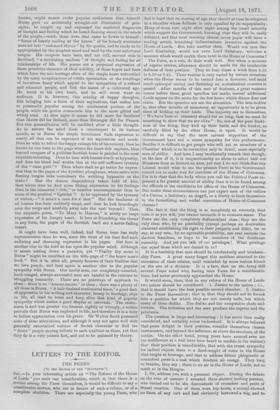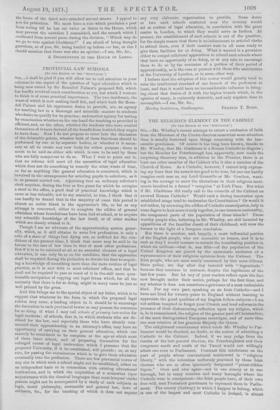LETTERS TO THE EDITOR.
THE PEERS.
[TO THE EDITOR OF THE " SPEOTATOR.1 Sur,—In your interesting article on "-The Reform of the House of Lords " you omit one consideration, which is, that there is a section among the Peers themselves, it would be difficult to say a considerable section, who are in favour of such a reform, or of a complete abolition. There are especially the young Peers, who
I feel it hard that on coming of age they should at once be relegated to a chamber whose dullness is only equalled by its unpopularity.
Many of them vote night after night among the small minority which support the Government, knowing that they will be easily defeated, and that next morning almost every paper will have a leading article launching indiscriminate invective against the House of Lords. But take another class. Would not men like Lord Kimberley, would not even Lord Salisbury, welcome a measure which would enable them to sit in the House of Commons?
The Peers, as a rule, do their work well. But when a moment of caprice arrives, allowance should be made for the intolerable dullness of their position. They sit four times a week from 5.15 to 5.30 or 5.45. Their routine is only varied by certain occasions
when the House seems to be turned into a dovecote, and amid much episcopal cooing and fluttering an ecclesiastical measure is passed. After months of this sort of business, a great measure comes before them, great speeches are made, several additional Lords appear on the scene for the few hours which dinner does not claim. But the speeches are not the attraction. The true motive is, that after months of monotony, an opportunity is to be given them of kicking up their heels. The majority say to themselves, " We have been so intensely stupid for so long, that we must do something to show that we are alive." So, out of the pure friski- ness of the thing, they kick up their heels, and the bucket, so carefully filled by the other House, is upset. It would be difficult to say that the most earnest supporters of the Government have not a secret sympathy for this performance.
Besides it is difficult to get people who will act as members of a Chamber which is to be corrective only in detail, more especially men of ability. And here I may incidentally remark that though,
on the face of it, it is unquestionably an abuse to select half or Ministers from so limited an area, yet that I do not think that any
Liberal would wish to see the present Peers in the Government
turned out to make way for members of the House of Commons.. For it is clear that the body whom you call the Politics' Peers re-
present a far greater amount of ability than is to be found among the officials or the candidates for office of the House of Commons- But under these circumstances can you expect men of the calibre of a Cairns, a Salisbury, an Argyll, or a Derby to limit themselves. to the formalizing and verbal correction of House-of-Commons clauses ?
The fact is that the thing is so completely an anomaly, that turn it as you will, you cannot reconcile it to common-sense. The- Peers are the only completely disfranchised class ; they are the only class who, by no possibility (except perhaps an Australian claimant establishing his right to their property and title), let us•
say, at any rate, by no agreeable possibility, can ever exercise the• elective franchise, or hope to be members of the dominant assembly. And yet you talk of our privileges 1 What privilege can equal those which are denied to us?
It is a hardship that men should be involuntarily and irredeem- ably Peers. A great many forget this accident attached to the- succession of their estates, until reminded by some zealous friend, on the eve of a division. It is a fact, that on the Army Bill several Peers voted who, having been Peers for a considerable- time, had never previously approached the House.
It would seem, then, that in any reform of the House of Lords- two points should be considered. 1. Justice to the nation ; i.e.,
that it should have the best possible second chamber. 2. Justice to the Peers themselves ; that is, that they should not be forced into a position for which they are not merely unfit, but which many of them dislike. The dislike and the compulsion chafe and irritate. The irritation and -the sore produce the caprice and the petulance.
The question is large and interesting ; it has never been really considered, and certainly never understood. It is always believed that peers delight in their position, consider themselves chosen instruments, and beyond the influence, as above the emotions, of the nation. On the other hand, young peers have assured even me (as wallflowers at a ball have been heard to confide in the waiters).
that their position is unendurable, that with the truest sympathy for radical objects there is a dead-weight of votes in the House that laughs at leverage, and that to address fifteen phlegmatic or somnolent peers is a task which deadens all energy. They long, to breathe, they say ; there is no air in the House of Lords, not so much as in the Morgue.
I, Sir, address you with a personal object. During the debate on the vote of censure I arrested three sinister-looking persons, who turned out to be the descendants of crusaders and peers of Stuart creation. One of them wore top-boots, a second showed no linen of any sort and had obviously borrowed a wig, and to
the boots of the third were attached several straws. I appeal to you for protection. We must have a rule which precludes a peer from voting till he has sat twice or thrice in the House, which may prevent the mistakes I committed, and the remark which I overheard from several peers during the division, " Which way do we go to vote against Gladstone?" I am afraid of being thought garrulous, or of you, Sir, being hauled up before our bar, or else 1 should meution that there was also an epithet.—I am, Sir, &c., A DOORKEEPER IN Tint HOUSE OF LORDS.































 Previous page
Previous page